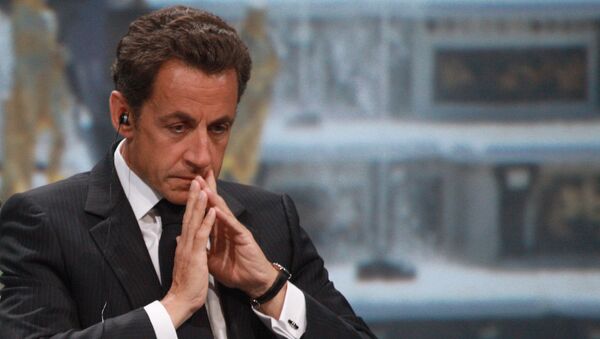Among the key issues that will emerge once the war in Libya inevitably ends will be the political future of the Western backers of the intervention in Libya, primarily, the French President Nicholas Sarkozy and his advisors. Will these politicians reap the benefits of victory, or will they be blamed for what still could be a protracted war? This is a big issue in Europe, as it was the French planes that fired the opening shots in the NATO operation.
According to Le Monde, Sarkozy has made this war his own. He has staked his reputation on the Western intervention. For months, he spent hours poring over war maps and kept in constant contact with the Libyan rebels and his informal publicist, Bernard-Henri Levy, who humbly presents himself to the world media as a philosopher defending the cause of peace.
During his meeting in Paris last Thursday with Mahmoud Jibril, the number two in the rebel leadership, Sarkozy announced an international conference on assistance to Libya, to be held in France on September 1. Sarkozy says that the NATO military operation and the activities of the international contact group are winding down, and that Russia, China, India and Brazil - members of the UN Security Council who did not support the NATO military intervention - are invited to participate in the upcoming conference. "In this way, Sarkozy let Russia know that it can play a role in the new Libya," believes former Russian ambassador to the United Kingdom Anatoly Adamishin.
But what does the invitation really mean? Does it show confidence in ultimate victory, or is it just a last-ditch attempt to get as many players as possible involved in this failing project? Was the NATO intervention a success or a failure? This question will be answered, to a large extent, by the actions by the new Libyan government, which will be formed by the National Transitional Council (NTC), the rebel government recognized by France in March in the run-up to the military intervention. Will the new government be able to prevent a blood bath and brutal retaliation against loyalist forces? By bringing new people to power in Tripoli, Sarkozy and his advisors have assumed a great responsibility. Many in France wonder now if the decision made in March was the right one.
Bernard-Henri Levy played a pivotal role in the intervention. He is the one who called Sarkozy's cell phone in early March and told him that he "absolutely must see the Libyan Massouds," alluding to the leader of the Afghan mujahedeen.
Sarkozy agreed and 24 hours later, on March 10, 2011, France recognized the NTC. Foreign Minister Alain Juppe was informed about the meeting only after the fact - a testament to the influence of the "philosopher." Today, Levy is convinced that he did the right thing. Answering a question on his website about the fate of Gaddafi, his family and supporters, he said coolly: "Let the Libyans decide... I'm not in the least bit concerned, because the leaders of the National Transitional Council have proved their political maturity. They are not motivated by a desire for revenge; we are now witnessing the laying of the first bricks of a nation of laws." In all his interviews since March, Levy invariably says that the rebels managed to overcome "the temptation of Islamism" and have no connections with radical Islam. Regarding detractors of the rebel movement, Levy fancifully described them as "adepts of despotism hypnotized by a modern Medusa - the belief that tyrants cannot be toppled."
Alas, such words are all too familiar. We heard such talk several times from Levy himself and other French left-wing intellectuals, who on March 17 signed an appeal to Sarkozy and heads of NATO nations, published in Le Monde, calling for military intervention in Libya. At least one-third of the people who signed this appeal also signed appeals in 1995, 2000 and 2004, also published by Le Monde, which supported the secessionist Chechen Republic of Ichkeriya and its governments led by "presidents" Dzhokhar Dudayev and Aslan Maskhadov. In those appeals, Levy, his fellow "philosopher" Andre Glucksmann, deputy of the European parliament Daniel Cohn-Bendit and others called on Western leaders to boycott the celebration in Moscow of the 50th anniversary of the victory in WWII, to revoke Russia's membership in international organizations, and to provide assistance to Maskhadov. In 2011, the same group of people implored Sarkozy to help Mahmoud Jibril and the Libyan rebels.
When asked whether Maskhadov and his fighters were involved in global terrorism, Glucksmann and Levy answered with more fanciful metaphor. According to Glucksmann, the rebels "resisted the call of the radical Islamist sirens." We had many chances to judge the veracity of this statement since 2002.
Lie just once and no one will ever believe you again. The objectivity of the intellectual force behind the Libya intervention is called into question by their support for the Chechen rebels. It is entirely possible that soon the world will see acts of vengeance and terrorism and the rise of radical Islam in Libya. In that case, it will be hard to say that Sarkozy won.
The views expressed in this article are the author's and may not necessarily represent those of RIA Novosti.

